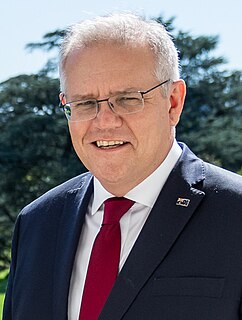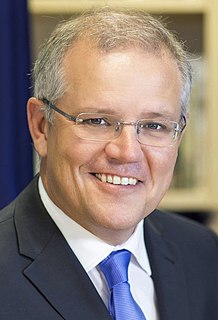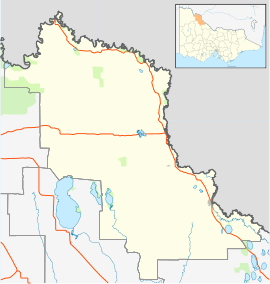
The Australian Labor Party (ALP), also simply known as Labor, is the major centre-left political party in Australia, one of two major parties in Australian politics, along with the centre-right Liberal Party of Australia. After serving as Opposition in the federal parliament since the 2013 election, the Labor Party was returned to government in the 2022 election. The ALP is a federal party, with political branches in each state and territory. They are currently in government in Victoria, Queensland, Western Australia, South Australia, the Australian Capital Territory, and the Northern Territory. The Labor Party is the oldest political party in Australia being established on the 8th of May 1901 in the House of Parliament in East Melbourne.
The Australian Broadcasting Corporation (ABC) is the national broadcaster of Australia. It is principally funded by direct grants from the Australian Government and is administered by a government-appointed board. The ABC is a publicly-owned body that is politically independent and fully accountable, with its charter enshrined in legislation, the Australian Broadcasting Corporation Act 1983. ABC Commercial, a profit-making division of the corporation, also helps to generate funding for content provision.

The Liberal Party of Australia is a centre-right political party in Australia, one of the two major parties in Australian politics, along with the centre-left Australian Labor Party. It was founded in 1944 as the successor to the United Australia Party.

New South Wales is a state on the east coast of Australia. It borders Queensland to the north, Victoria to the south, and South Australia to the west. Its coast borders the Coral and Tasman Seas to the east. The Australian Capital Territory and Jervis Bay Territory are enclaves within the state. New South Wales' state capital is Sydney, which is also Australia's most populous city. In June 2020, the population of New South Wales was over 8.1 million, making it Australia's most populous state. Just under two-thirds of the state's population, 5.3 million, live in the Greater Sydney area.

Oceania is a geographic region that includes Australasia, Melanesia, Micronesia and Polynesia. Spanning the Eastern and Western Hemispheres, Oceania is estimated to have a land area of 8,525,989 square kilometres (3,291,903 sq mi) and a population of over 41 million. When compared with the continents, the region of Oceania is the smallest in land area and the second smallest in population after Antarctica. Its five major population centres are Sydney, Melbourne, Brisbane, Perth, and Auckland.

The prime minister of Australia is the head of government of the Commonwealth of Australia. The prime minister heads the executive branch of the federal government of Australia and is also accountable to federal parliament under the principles of responsible government. Anthony Albanese of the Labor Party became prime minister on 23 May 2022.

Sydney is the capital city of the state of New South Wales, and the most populous city in Australia and Oceania. Located on Australia's east coast, the metropolis surrounds Port Jackson and extends about 70 km (43.5 mi) on its periphery towards the Blue Mountains to the west, Hawkesbury to the north, the Royal National Park to the south and Macarthur to the south-west. Sydney is made up of 658 suburbs, spread across 33 local government areas. Residents of the city are known as "Sydneysiders". As of June 2020, Sydney's estimated metropolitan population was 5,361,466, meaning the city is home to approximately 66% of the state's population. Nicknames of the city include the 'Emerald City' and the 'Harbour City'.

Queensland is a state situated in northeastern Australia, and is the second-largest and third-most populous Australian state. It is bordered by the Northern Territory, South Australia, and New South Wales to the west, south-west and south respectively. To the east, Queensland is bordered by the Coral Sea and the Pacific Ocean. To its north is the Torres Strait, separating the Australian mainland from Papua New Guinea. With an area of 1,852,642 square kilometres (715,309 sq mi), Queensland is the world's sixth-largest sub-national entity, and is larger than all but 15 countries. Due to its size, Queensland's geographical features and climates are diverse, including tropical rainforests, rivers, coral reefs, mountain ranges and sandy beaches in its tropical and sub-tropical coastal regions, as well as deserts and savanna in the semi-arid and desert climatic regions of its interior.

The House of Representatives is the lower house of the bicameral Parliament of Australia, the upper house being the Senate. Its composition and powers are established in Chapter I of the Constitution of Australia.

The Australian Greens, commonly known as The Greens, are a left-wing confederation of Green state and territory political parties in Australia. As of the 2022 federal election, the Greens were the third largest political party in Australia by vote and the fifth largest by elected representation. The leader of the party is Adam Bandt, and the party's co-deputy leaders are Larissa Waters and Nick McKim.

Anthony Norman Albanese is an Australian politician who is the 31st and current prime minister of Australia. He has been the leader of the Australian Labor Party (ALP) since 2019, and member of parliament (MP) for Grayndler since 1996. Albanese was the 15th deputy prime minister of Australia under the second Rudd government in 2013 and a cabinet minister in the Rudd and Gillard governments from 2007 to 2013.

Andrew Symonds was an Australian international cricketer, who played all three formats as a batting all-rounder. Commonly nicknamed "Roy", he was an important member of two World Cup winning squads. Symonds played as a right-handed, middle order batsman and alternated between medium pace and off-spin bowling. He was also notable for his exceptional fielding skills.

In Australia, electoral districts for the Australian House of Representatives are called divisions or more commonly referred to as electorates or seats. There are currently 151 single-member electorates for the Australian House of Representatives.

The states and territories are federated administrative divisions in Australia, ruled by regional governments that constitute the second level of governance between the federal government and local governments. States are self-governing polities with incomplete sovereignty and have their own constitutions, legislatures, departments, and certain civil authorities that administer and deliver most public policies and programmes. Territories can be autonomous and administer local policies and programmes much like the states in practice, but are still constitutionally and financially subordinate to the federal government and thus have no true sovereignty.

Australia, officially the Commonwealth of Australia, is a sovereign country comprising the mainland of the Australian continent, the island of Tasmania, and numerous smaller islands. With an area of 7,617,930 square kilometres (2,941,300 sq mi), Australia is the largest country by area in Oceania and the world's sixth-largest country. Australia is the oldest, flattest, and driest inhabited continent, with the least fertile soils. It is a megadiverse country, and its size gives it a wide variety of landscapes and climates, with deserts in the centre, tropical rainforests in the north-east, and mountain ranges in the south-east.

Scott John Morrison is an Australian politician who served as the 30th prime minister of Australia from 2018 to 2022. He assumed office in August 2018 upon his election as leader of the Liberal Party of Australia, after winning a leadership spill.

Melbourne is the capital and most-populous city of the Australian state of Victoria, and the second-most populous city in both Australia and Oceania. Its name generally refers to a 9,993 km2 (3,858 sq mi) metropolitan area known as Greater Melbourne, comprising an urban agglomeration of 31 local municipalities, although the name is also used specifically for the local municipality of City of Melbourne based around its central business area. The city occupies much of the northern and eastern coastlines of Port Phillip Bay and spreads into the Mornington Peninsula and the hinterlands towards the Yarra Valley and the Dandenong and Macedon Ranges. It has a population over 5-million, mostly residing to the east side of the city centre, and its inhabitants are commonly referred to as "Melburnians".

The 2019 Australian federal election was held on Saturday 18 May 2019 to elect members of the 46th Parliament of Australia. The election had been called following the dissolution of the 45th Parliament as elected at the 2016 double dissolution federal election. All 151 seats in the House of Representatives and 40 of the 76 seats in the Senate were up for election.

The 2022 Australian federal election was held on 21 May 2022 to elect members of the 47th Parliament of Australia. The incumbent Liberal/National coalition government led by Prime Minister Scott Morrison sought to win a fourth consecutive term in office but was defeated by the opposition, the Labor Party led by Anthony Albanese. The Greens, United Australia, One Nation, other minor parties, and independents also contested the election. Up for election were all 151 seats in the lower house, the House of Representatives, and 40 of the 76 seats in the upper house, the Senate.
















